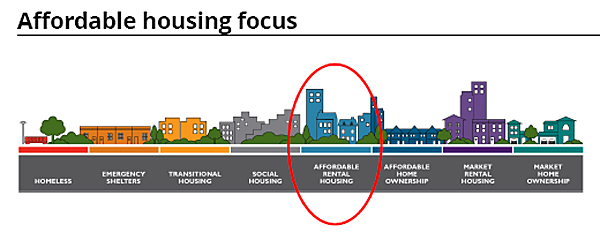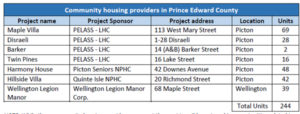Ball for affordable housing plans back in council’s court
Sue Capon | Jan 07, 2020 | Comments 9
 With high demand for affordable housing in Prince Edward County, the municipality’s new housing corporation is well on its way to sorting out the time, money and process necessary to move forward.
With high demand for affordable housing in Prince Edward County, the municipality’s new housing corporation is well on its way to sorting out the time, money and process necessary to move forward.
Now it’s back in council’s hands as it heads into budget deliberations at month end.
The Prince Edward County Affordable Housing Corporation (PECAHC) was set up by the municipality last January to increase the supply of affordable housing. Various statistics report up to 30 per cent of residents are in housing classed as unaffordable for their earnings ratio.
 Tuesday night, Treat Hull, the founding board’s president, updated County councillors on progress, and a business plan. The focus will be on affordable housing as opposed to social housing, with rental homes for working age adults and seniors being the immediate priorities, but sustaining family-oriented options over the longer term.
Tuesday night, Treat Hull, the founding board’s president, updated County councillors on progress, and a business plan. The focus will be on affordable housing as opposed to social housing, with rental homes for working age adults and seniors being the immediate priorities, but sustaining family-oriented options over the longer term.
Demand, he said, is greatest for smaller sized, one-bedroom units, in apartments, while ground-oriented housing is more suitable for families.
Working with municipal staff, PECAHC first seeks County surplus land, leading to an initial focus on a larger scale, multi-residential development at the former Wellington Arena land and a smaller scale project, a four or five-plex on a vacant municipal lot on Disraeli Street in Picton.
PECAHC will also look to collaborate with the Prince Edward Lennox Addington Social Services as it is currently conducting a review of its assets in the County.
The corporation needs both operating, and capital funding. Hull noted the corporation would seek continued stable funding from council for the operating budget as there are no grant opportunities. The $130,000 ask is driven primarily by the need for a qualified executive director, audits, insurance, legal services and supplies.
Hull answered a councillor’s question about having staff, or robust volunteers, conduct the work an executive director would do, at least in the beginning.
Should council approve a budget, and transfer the arena land, the project would begin immediately, Hull said, noting he has high regard for municipal staff, but they have many competing priorities.
“Part of the reason the housing corporation was set up was to have a single beady-eyed focus on affordable housing,” said Hull. “I fear the alternative you’re proposing to do it in-house may look good on paper but given the diverse workload staff is carrying, you’d get radically less done and the cost would be the same, or greater… A single-minded focus will serve the community.”
For capital funding, opportunities are also being examined with senior government and philanthropic gifts or grants, as well as an eye on the municipality approving a new accommodation tax that could be dedicated to capital for affordable housing – which, he said the economic development department conservatively estimates could amount to $200,000 annually. (Half goes to hospitality industry and the municipality retains half).
“We are sensitive to the fact council is concerned about the tax burden and we want to get the maximimum housing with the least burden on taxpayers,” said Hull. ” There’s a certain rough justice at work here. Tourism is a good thing. We all acknowledge that. It does have its downsides and one is it has attracted a lot of people who want to live here, who have generous incomes or means and now we have a radical rise in the cost of housing as a result; and, tourists wear out our roads.
“So, my notion is it’s payback time. You can come here as tourists, you’ve run up the house prices and worn out our roads… so tourists can contribute, or bear some of the burden for difficulties in affordable housing.”
And while he notes a $200,000 capital fund sounds like a lot of money, current all-in costs to deliver affordable multi-unit residential developments can be in the range of $200,000 to $275,000 per unit, for one or two-bedroom units. (including land costs, soft costs, design fees, project management, technical testing, construction costs, site servicing, etc.)
Accommodation tax, Hull said, would be an ideal strategy to transition to non taxpayer funding.
For Wellington’s project, PECAHC wants to get a move on, predicting six to eight months for demolition, environmental testing and site preparation before a shovel can be put into the ground. That cost is estimated at $200,000 to $250,000.
Pre-development of Disraeli Street land and development of concept for a multiplex pilot project (including environmental testing/certification, geo-technical studies and project design services) is estimated at $120,000 to $135,000.
 Currently there are 244 units for community housing in Picton and Wellington.
Currently there are 244 units for community housing in Picton and Wellington.
A development services report also on council’s agenda Tuesday night referenced 3,500 housing units throughout the County that are at various stages of discussion.
Hull noted that “it’s unlikely that all these units will actually get built, but even if just one third end up being built, it’s a massive number, but few would be in the affordable housing category.
“The need is many times the resource that is available,” said Hull. “We are not going to cure affordable housing, but we are going to make a dent in it if we’re successful.”
Filed Under: Featured Articles • Local News
About the Author:

































The cost of even a small new build bungalows is getting higher and higher every year, driven by labour, materials and development costs.
What about tiny homes?
https://hamiltonagingtogether.ca/tiny-home-magic/
Also, here is an interesting article below that goes into more detail:
https://www.raisethehammer.org/article/3611/livable_lanes:_laneway_housing_in_hamilton
Existing Affordable housing in the County could use a shake down, too many folks living in bigger units then they need. This is a fact and Ontario housing certainly doesn’t work. My opinion thx
I don’t believe anyone disagrees with obtaining affordable housing. But we do need to define what it means – no developer is going to build homes at reduced prices, so we need government to foot most of the cost and to create reasonably priced homes to “qualified” buyers or renters.
How about promoting affordable housing by not making housing more expensive? How about lowering the minimum lot size? How about lowering the minimum house size? How about permitting more duplexes and triplexes?
How about making housing affordable by increasing income through more employment? How about not running business investment out of the county? How about easing up on development fees? How about making life more affordable with public transit?
Our instinct is to respond to every problem with “government should do something” when often the problem is government is doing too much already.
All of the concerns in these comments have been examined.
The report already says affordable housing be included in new developments, and that funding will be sought from senior governments and other sources – which could include a new accommodation tax – to avoid any taxpayer suffering.
And council has already declared its annual support of affordable housing, so not so much a ‘new’ budget line.
And it also states why it’s better to go with an executive director to get it done faster, and likely at the same cost.
Sounds like no stone is being left unturned to quickly get some housing to people who need it most.
New developments. Show us some affordable housing included and we move forward.
I agree with both Dennis and Emily on this one. A small local Council with a very limited tax base cannot take on affordable housing as a primary function or leading strategic goal. This can only happen with Provincial/Federal funding. With one unit being estimated at $250,000 it is just nonsense to even think the County can take this on, as needed as it is as we all know.
I am puzzled as to why Hastings County has received Millions in funding for affordable housing over last couple of years, yet Prince Edward has nothing. Could it be we do not know how to apply and access available funding opportunities?
Let me get this straight – our Council formed an Affordable Housing Corp. to investigate affordable housing opportunities in PEC. The first report back to council requires $130,000 for operating costs for this new organization – for lawyers, qualified help, and materials. Hmmmm? Sounds like some want to build a new career out of this.
Can anyone tell me why the taxpayers already pay for having a council and staff? Let’s be frank, our staff should be able to do this job and council needs to get the money for housing from upper levels of government – you know we do have both a federal and provincial rep here – make them work to get us the money!
Having this new committee already asking for a budget line is a joke – it is time for the public to tell them all – we can’t afford such unnecessary committees and to direct council to do the job they were elected to do! This effort of finding affordable housing should not cost the public anymore money!